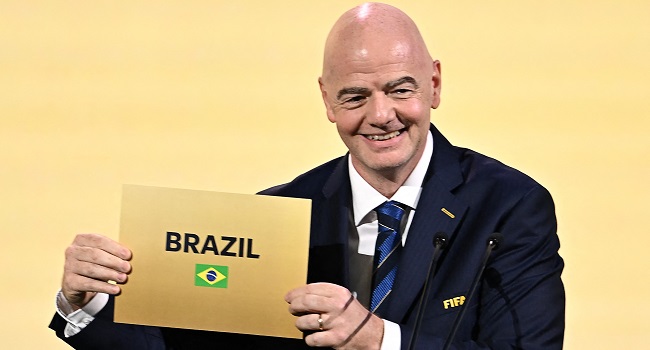
Brazil beat a joint bid by Belgium, Netherlands and Germany to become first South American nation to host the event.
Brazil has been declared host of the 2027 Women’s World Cup after winning a vote at the annual FIFA Congress on Friday, beating the joint bid of Belgium, Netherlands and Germany to become the first South American country picked to stage the tournament.
Brazil won with 119 votes versus 78 for the joint European entry, boosted by a technical evaluation from world governing body FIFA that gave a high score for its commercial plan and stadiums purpose-built for the 2014 Men’s World Cup.
“We knew we would be celebrating a victory for South American women’s soccer and for women,” said Ednaldo Rodrigues, president of the Brazilian Football Confederation.
“You can be sure, with no vanity, we will accomplish the best World Cup for women.”
The vote on the Women’s World Cup had been whittled down to two candidates after the United States and Mexico withdrew to pursue the 2031 tournament instead.
Brazil had scored 4.0 out of 5 compared with 3.7 for Belgium-Netherlands-Germany in the FIFA evaluation, which had highlighted the European bid’s compactness, solid commercial viability and short distances between venues, but noted smaller capacities of its 13 stadiums.
Brazil was working to give FIFA ‘what it needed’
Brazil football chief Rodrigues said the win was the result of conviction, not lobbying.
“We were not campaigning, asking for votes. We were working to give FIFA what it needed,” he said.
The bid’s operational manager Valesca Araujo said the aim was to boost women’s football in South America, which was underdeveloped and had huge potential.
“The concept we presented went beyond a sports tournament. We worked for a transformation,” she said.
“Now, we have to celebrate. It’s a great achievement for South America.”
FIFA pledged to be tough on racism, with a call for strict measures to be implemented by all members for instances of abuse, including forfeiting of matches, and introducing racism as an offence in players’ disciplinary codes.
It advocates suspending or abandoning games, plus the introduction of a global standard gesture for players to inform referees of racist abuse.
“If it is a problem of society and society can’t deal with it, let’s deal with it in football once and for all,” Infantino said.
Infantino also weighed in on what he called a “futile debate” about the volume of matches played globally, arguing FIFA organised about 1 percent of club games and just 1 percent to 2 percent of national team matches.
He reminded delegates that most FIFA members “would have no football without the resources” that FIFA provides.
“I hope these figures will show that we should probably stop this futile debate, it’s really pointless, and focus on what we need to do,” he said.

